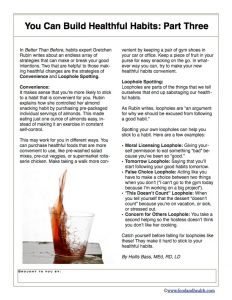You Can Build Healthful Habits: Part Three
In Better Than Before, habits expert Gretchen Rubin writes about an endless array of strategies that can make or break your good intentions. Two that are helpful to those making healthful changes are the strategies of Convenience and Loophole Spotting.Convenience:It makes sense that you’re more likely to stick to a habit that is convenient for you. Rubin explains how she controlled her almond snacking habit by purchasing pre-packaged individual servings of almonds. This made eating just one ounce of almonds easy, instead of making it an exercise in constant self-control.This may work for you in different ways. You can purchase healthful foods that are more convenient to use, like pre-washed salad mixes, pre-cut veggies, or supermarket rotisserie chicken. Make taking a walk more convenient by keeping a pair of gym shoes in your car or office. Keep a piece of fruit in your purse for easy snacking on the go. In whatever way you can, try to make your new healthful habits convenient.Loophole Spotting:Loopholes are parts of the things that we tell ourselves that end up sabotaging our healthful habits.As Rubin writes, loopholes are “an argument for why we should be excused from following a good habit.”Spotting your own loopholes can help you stick to a habit. Here are a few examples:
- Moral Licensing Loophole: Giving yourself permission to eat something “bad” because you’ve been so “good.”
- Tomorrow Loophole: Saying that you’ll start following your good habits tomorrow.
- False Choice Loophole: Acting like you have to make a choice between two things when you don’t (“I can’t go to the gym today because I’m working on a big project”).
- “This Doesn’t Count” Loophole: When you tell yourself that the dessert “doesn’t count” because you’re on vacation, or sick, or stressed out.
- Concern for Others Loophole: You take a second helping so the hostess doesn’t think you don’t like her cooking.
Catch yourself before falling for loopholes like these! They make it hard to stick to your healthful habits.By Hollis Bass, MEd, RD, LDPDF Handout:
